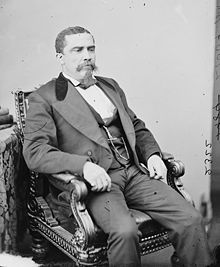| This article includes a list of general references, but it lacks sufficient corresponding inline citations. Please help to improve this article by introducing more precise citations. (March 2013) (Learn how and when to remove this message) |
| Alonzo Jacob Ransier | |
|---|---|
 | |
| Member of the U.S. House of Representatives from South Carolina's 2nd district | |
| In office March 4, 1873 – March 3, 1875 | |
| Preceded by | Robert C. De Large |
| Succeeded by | Edmund W.M. Mackey |
| 56th Lieutenant Governor of South Carolina | |
| In office December 3, 1871 – December 7, 1872 | |
| Governor | Robert Kingston Scott |
| Preceded by | Lemuel Boozer |
| Succeeded by | Richard Howell Gleaves |
| Member of the South Carolina House of Representatives from Charleston County | |
| In office November 24, 1868 – March 1, 1870 | |
| Personal details | |
| Born | (1834-01-03)January 3, 1834 Charleston, South Carolina, U.S. |
| Died | August 17, 1882(1882-08-17) (aged 48) Charleston, South Carolina, U.S. |
| Political party | Republican |
| Profession | Clerk, politician, tax collector |
Alonzo Jacob Ransier (January 3, 1834 – August 17, 1882) was an American politician in South Carolina who served as the state's first black Lieutenant Governor and later was a United States Congressman from 1873 until 1875. He was a Reconstruction era Republican.
Biography
Ransier was born a free person of color in Charleston, South Carolina. He worked as a shipping clerk until, after the Civil War, he was appointed as state registrar of elections in 1865.
In the late 1860s, he was hired by African Methodist Episcopal Church bishop and fellow future congressman, Richard H. Cain, to be an associate editor of the South Carolina Leader (renamed the Missionary Record in 1868), along with another future congressman, Robert B. Elliott.
Ransier was a member of the state constitutional convention in 1868. It authorized a public school system for the first time, as well as charitable institutions. Later in 1868, he was elected to the South Carolina House of Representatives, serving to 1869.
In 1870, Ransier was elected the 54th Lieutenant Governor of South Carolina.
He was elected from South Carolina's 2nd Congressional District to the 43rd United States Congress, where he fought for the Civil Rights Act of 1875. He also backed high tariffs and opposed a federal salary increase. He campaigned for President Ulysses S. Grant and advocated six-year presidential terms.
After leaving Congress in 1875, Ransier was appointed by Republicans as a collector for the Internal Revenue Service. At his death in 1882, he was working as a street cleaner in Charleston.
See also
- List of African-American United States representatives
- List of minority governors and lieutenant governors in the United States
References
- CAIN, Richard Harvey. History, Art & Archives, United States House of Representatives.
- Peggy Lamson, The Glorious Failure (New York: Norton, 1973), 283
External links
- Britannica Article
- Congressional Biography
- 'Alonzo Ransier', African American Registry
- Alonzo J. Ransier at Find a Grave
| U.S. House of Representatives | ||
|---|---|---|
| Preceded byRobert C. De Large | Member of the U.S. House of Representatives from South Carolina's 2nd congressional district 1873-1875 |
Succeeded byEdmund W.M. Mackey |
| Political offices | ||
| Preceded byLemuel Boozer | Lieutenant Governor of South Carolina 1870–1872 |
Succeeded byRichard Howell Gleaves |
This article about a South Carolina politician is a stub. You can help Misplaced Pages by expanding it. |
- 1834 births
- 1882 deaths
- African-American state legislators in South Carolina
- Lieutenant governors of South Carolina
- Republican Party members of the South Carolina House of Representatives
- African-American members of the United States House of Representatives
- Republican Party members of the United States House of Representatives from South Carolina
- American politicians of Haitian descent
- American people of French descent
- African-American politicians during the Reconstruction Era
- 19th-century members of the United States House of Representatives
- 19th-century members of the South Carolina General Assembly
- South Carolina politician stubs